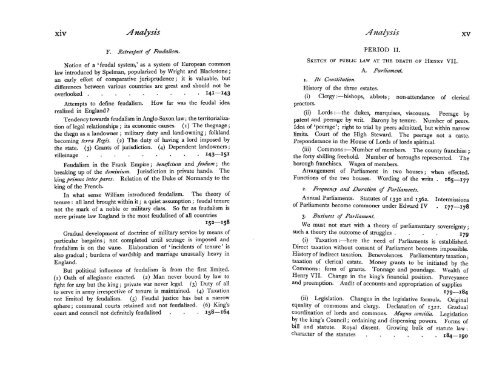The Constitutional History of England
The Constitutional History of England
The Constitutional History of England
You also want an ePaper? Increase the reach of your titles
YUMPU automatically turns print PDFs into web optimized ePapers that Google loves.
xivF. Retrospect <strong>of</strong> Feudalism. PERIOD 11.Notion <strong>of</strong> a 'feudal system,' as a system <strong>of</strong> European commonlaw introduced by Spelman, popularized by Wright and Blackstone ;an early effort <strong>of</strong> comparative jurisprudence; it is valuable, butdifferences between various countries are great and should not beoverlooked . . 141-143Attempts to define feudalism. How far was the feudal idearealised in <strong>England</strong> ?Tendency towards feudalism in Anglo-Saxon law; the territorialization<strong>of</strong> legal relationships ; its economic causes. (I) <strong>The</strong> thegnage ;the thegn as a landowner; military duty and land-owning; folklandbecoming terra Regis. (2) <strong>The</strong> duty <strong>of</strong> having a lord imposed bythe state. (3) Grants <strong>of</strong> jurisdiction. (4) Dependent landowners ;villeinage . . 143-151Feudalism in the Frank Empire; benejcium and feoakm; thebreaking up <strong>of</strong> the dominiunz. Jurisdiction in private hands. <strong>The</strong>kingprimus interpares. Relation <strong>of</strong> the Duke <strong>of</strong> Normandy to theking <strong>of</strong> the French.In what sense William introduced feudalism. <strong>The</strong> theory <strong>of</strong>tenure : all land brought within it ; a quiet assumption feudal tenurenot the mark <strong>of</strong> a noble or military class. So far as feudalism ismere private law <strong>England</strong> is the most feudalised <strong>of</strong> all countries152-158Gradual development <strong>of</strong> doctrine <strong>of</strong> military service by means <strong>of</strong>particular bargains; not completed until scutage is imposed andfeudalism is on the wane. Elaboration <strong>of</strong> 'incidents <strong>of</strong> tenure' isalso gradual ; burdens <strong>of</strong> wardship and marriage unusually heavy in<strong>England</strong>.But political influence <strong>of</strong> feudalism is from the first limited.(I) Oath <strong>of</strong> allegiance exacted. (2) Man never bound by law t<strong>of</strong>ight for any but the king; private war never legal. (3) Duty <strong>of</strong> allto serve in army irrespective <strong>of</strong> tenure is maintained. (4) Taxationnot limited by feudalism. (5) Feudal justice has but a narrowsphere; communal courts retained and not feudalised. (6) King'scourt and council not definitely feudalised . . 158-164SKETCH OF PUBLIC LAW AT THE DEATH OF HENRY VII.I. Its Constitution.<strong>History</strong> <strong>of</strong> the three estates.(i) Clergy :-bishops, abbots; non-attendance <strong>of</strong> clericalproctors.(ii) Lords :-the dukes, marquises, viscounts. Peerage bypatent and peerage by writ. Barony by tenure. Number <strong>of</strong> peers.Idea <strong>of</strong> 'peerage'; right to trial by peers admitted, but within narrowlimits. Court <strong>of</strong> the High Steward. <strong>The</strong> peerage not a caste.Preponderance in the House <strong>of</strong> Lords <strong>of</strong> lords spiritual.(iii) Commons :-Number <strong>of</strong> members. <strong>The</strong> county franchise ;the forty shilling freehold. Number <strong>of</strong> boroughs represented. <strong>The</strong>borough franchises.Wages <strong>of</strong> members.Arrangement <strong>of</strong> Parliament in two houses; when effected.Functions <strong>of</strong> the two houses. Wording <strong>of</strong> the writs . 165-1772. Frequency and Duration <strong>of</strong> Parliaments.Annual Parliaments. Statutes <strong>of</strong> 1330 and 1362. Intermissions<strong>of</strong> Parliaments become commoner under Edward IV . 177-1783. Business <strong>of</strong> Parliament.We must not start with a theory <strong>of</strong> parliamentary sovereignty;such a theory the outcome <strong>of</strong> struggles . . I79(i) Taxation :-here the need <strong>of</strong> Parliaments is established.Direct taxation without consent <strong>of</strong> Parliament becomes impossible.<strong>History</strong> <strong>of</strong> indirect taxation. Benevolences. Parliamentary taxation;taxation <strong>of</strong> clerical estate. Money grants to be initiated by theCommons: form <strong>of</strong> grants. Tonnage and poundage. Wealth <strong>of</strong>Henry VII. Change in the king's financial position. Purveyanceand preemption. Audit <strong>of</strong> accounts and appropriation <strong>of</strong> supplies179-184(ii) Legislation. Changes in the legislative formula. Originalequality <strong>of</strong> commons and clergy. Declaration <strong>of</strong> 1322. Gradualcoordination <strong>of</strong> lords and commons. Mapa conn7ia. Legislationby the king's Council ; ordaining and dispensing powers.Forms <strong>of</strong>bill and statute. Royal dissent. Growing bulk <strong>of</strong> statute law:character <strong>of</strong> the statutes . . 184-190
















